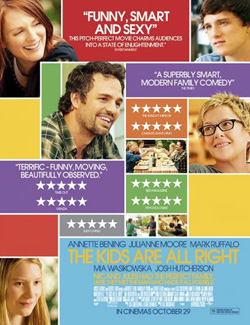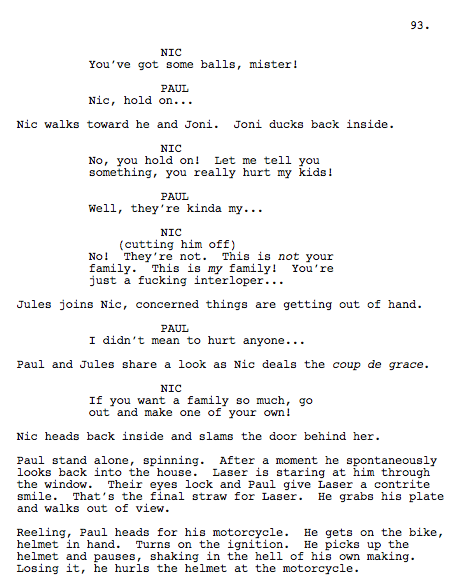
By analysing the categories in which films have (and have not) been nominated for the 2011 Golden Globe awards, you can tell what worked – and didn’t work – in this year’s crop of screenplays. In particular, the nominations confirmed my views about Inception, Easy A, The Kids Are All Right and The Social Network.
Let me preface this by saying that any film that gets a Golden Globe nomination, in any category, has done very well for itself. If our films got a gong we’d be thrilled to bits. However, when the nominations were announced, I was intrigued to see how accurately they summed up the strengths and weaknesses of this year’s produced screenplays:
Inception – No Actor nominations
 Inception was one of the most successful films of 2010, taking more than $800m worldwide at the box office and receiving largely favourable reviews from the critics. It was nominated for Golden Globes in Best Screenplay, Best Director and Best Motion Picture – Drama. It will also categorically be among the 10 nominations for Best Film at the Oscars in March 2011. However, the glaring omission in this honour roll is the absence of any Actor nominations.
Inception was one of the most successful films of 2010, taking more than $800m worldwide at the box office and receiving largely favourable reviews from the critics. It was nominated for Golden Globes in Best Screenplay, Best Director and Best Motion Picture – Drama. It will also categorically be among the 10 nominations for Best Film at the Oscars in March 2011. However, the glaring omission in this honour roll is the absence of any Actor nominations.
Leo DiCaprio, one of the greatest actors of his generation, was snubbed. Did he suddenly forget how to act? No, the script just didn’t give him anything to play. The characterisation of Cobb was thinner than Sarah Palin’s argument for the US Presidency. This weakness in the screenplay prevented us from believing in and wholly engaging with the character and it’s why Inception just didn’t do it for me. It’s also why Inception will have little chance of beating The Social Network or The King’s Speech to Best Film at either the Golden Globes or the Oscars.
Easy A – Actor nomination only
 For her star turn in Easy A, Emma Stone was rightly nominated for Best Actress in a Comedy or Musical. She was a revelation. However, the film wasn’t nominated in any other category – nothing for any of her support cast and nothing for screenplay, director or film.
For her star turn in Easy A, Emma Stone was rightly nominated for Best Actress in a Comedy or Musical. She was a revelation. However, the film wasn’t nominated in any other category – nothing for any of her support cast and nothing for screenplay, director or film.
This tells you that the writer, Bert V. Royal, created a great character but that his story didn’t make as much of her as it should. And that was pretty much my summation of Easy A. Emma Stone was sensational playing a wonderfully engaging character but the script didn’t take her character anywhere interesting. No story, no higher honours.
The Kids Are All Right – No nomination for Mark Ruffalo
 For the most part, I liked The Kids Are All Right and so did the Hollywood Foreign Press Association. Annette Bening and Julianne Moore have both been nominated for Best Actress in a Comedy or Musical, and the film also garnered nominations for Best Screenplay and Best Motion Picture – Comedy or Musical. The nomination it missed out on – and which reflects my own reservations about the screenplay – was one for Mark Ruffalo as Best Supporting Actor.
For the most part, I liked The Kids Are All Right and so did the Hollywood Foreign Press Association. Annette Bening and Julianne Moore have both been nominated for Best Actress in a Comedy or Musical, and the film also garnered nominations for Best Screenplay and Best Motion Picture – Comedy or Musical. The nomination it missed out on – and which reflects my own reservations about the screenplay – was one for Mark Ruffalo as Best Supporting Actor.
Let’s get real. When an actor gets an award, it doesn’t just mean that they did a good job of not bumping into the furniture. It means that they were fortunate enough to play a well-crafted character. Mark Ruffalo as Paul, the non-committal, sperm-donating restaurateur seemed to have it all: a widely admired and thoroughly likeable actor playing an interesting character who was flawed, made poor choices and yet had an irresistible charm. His phrase, “Shut the front door!”, was my wife’s exclamation of choice for several weeks after we saw the film.
Good actor. Good character. So why no nomination?
One explanation is that the other 5 nominated actors gave better performances and/or that they played more interesting characters. Possibly. But another interpretation is that while writers Lisa Cholodenko and Stuart Blumberg conceived a great character, ultimately they treated him rather shabbily.
Where they lost me was on page 93 of the shooting script. After his affair with Jules (Julianne Moore) is uncovered, Paul comes to the house, trying to normalise relations with “the kids”, Laser and Joni.
I don’t remember him laying claim to the children so maybe this wasn’t in the film. But even without this, he still gets a brutal send-off from Nic and no support from either Jules or either of the kids. And that is the last we see of Paul in the film.
Paul didn’t create the problem in Jules and Nic’s marriage. He might have shown a lack of judgement in not appreciating the consequences of his actions, but for Paul it certainly wasn’t just about the sex. He formed a strong attachment to Jules and the children, and, as a result, changed his outlook on life. He turned his back on both Tanya at the restaurant and Brooke, the hydroponic cucumber grower. He’s probably the most likeable character in the film, he’s definitely the most transformed, and yet, when it really mattered, the writers slammed the door in his face.
Paul isn’t the only character who suffers here. Nic’s inability to recognise that he’s not the problem and her insensitivity to anyone’s pain but her own means that I end the film feeling that she – for all her fine moments – is ultimately unaltered by the passage. I’ve seen people commend the film for the “subtlety” of its ending but that’s just another way of saying it packed no punch.
I was willing to concede that, as a guy, I might have been showing a bias towards the male character, but my wife and several of her female friends were also very upset with where Paul ends up.
What’s interesting is that in searching for the shooting script I found an earlier draft where Paul was treated with far more humanity.
Here is the same section of the script from the draft dated March 2009, and you’ll note some significant differences:
You’ll see that in this version Paul makes no claim to parenthood and they make it very clear that he wasn’t the villain. Indeed, in the scene which follows this, where Julianne gives the speech to the family, she points out to them too that Paul is not the source of what ails the family. This too was left out of the final film.
I’m not saying that I love the execution of this earlier version, and I don’t find Jules’s speech to be an effective resolution in either draft, but there’s no question that the earlier script left us feeling a lot better about Paul.
Would Mark Ruffalo have received a nomination if his character journey had had a better destination? Maybe. Maybe not. But it certainly wouldn’t have harmed his chances and it would most definitely have improved my regard for the film.
UPDATE: OK, so the Academy went and ruined my theory by nominating Ruffalo for a Best Supporting Oscar. My opinion stands. His character got screwed.
The Social Network & The King’s Speech – the whole kit and kaboodle
Only two films – The Social Network and The King’s Speech – won nominations across all the main categories:
- Best Motion Picture
- Best Screenplay
- Best Director
- Best Actor
- Best Supporting Actor
All the other recognised films missed out on at least one major category. The Fighter and Black Swan weren’t acknowledged for Best Screenplay. The Kids Are All Right and 127 Hours missed out on Best Director. The Tourist isn’t included among the noms for Best Screenplay or Best Director. And, as mentioned, Inception’s actors went unrewarded (in accolades at least).
So, it looks like it’s a two-horse race for the Oscars this year. Will the Academy prefer the verbal dexterity and narrative complexity of Sorkin’s The Social Network – which I loved – or the classical transformation of The King’s Speech?
Which films didn’t get nominations that should have?
I thought Buried would get a screenplay nomination but I’m more upset that Four Lions missed out on both Screenplay and Best Film nominations. It was one of my Top 5 films of 2010.
What did you think of the Golden Globe nominations?
Do you agree with my assessment of what the nominations say about the screenplays of 2010? Am I totally wrong about Paul in The Kids Are All Right? Which films, actors and writers do you think have been unfairly overlooked? Let me know in the comments.
When are the next Cracking Yarns screenwriting courses
Related posts:
Why The Social Network shouldn’t work (and why it does)
Easy A gets A+ for character but C- for story
Why Inception didn’t do it for me
Screenwriting secrets found Buried in a box

